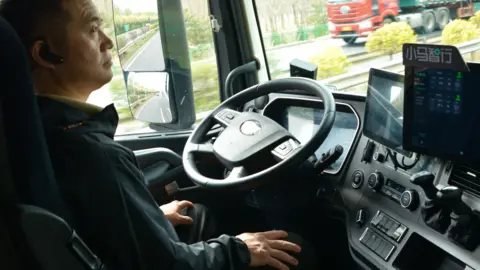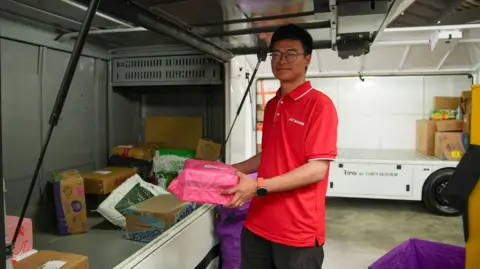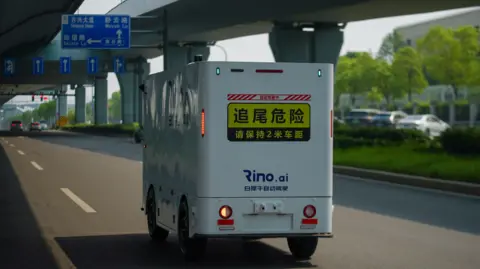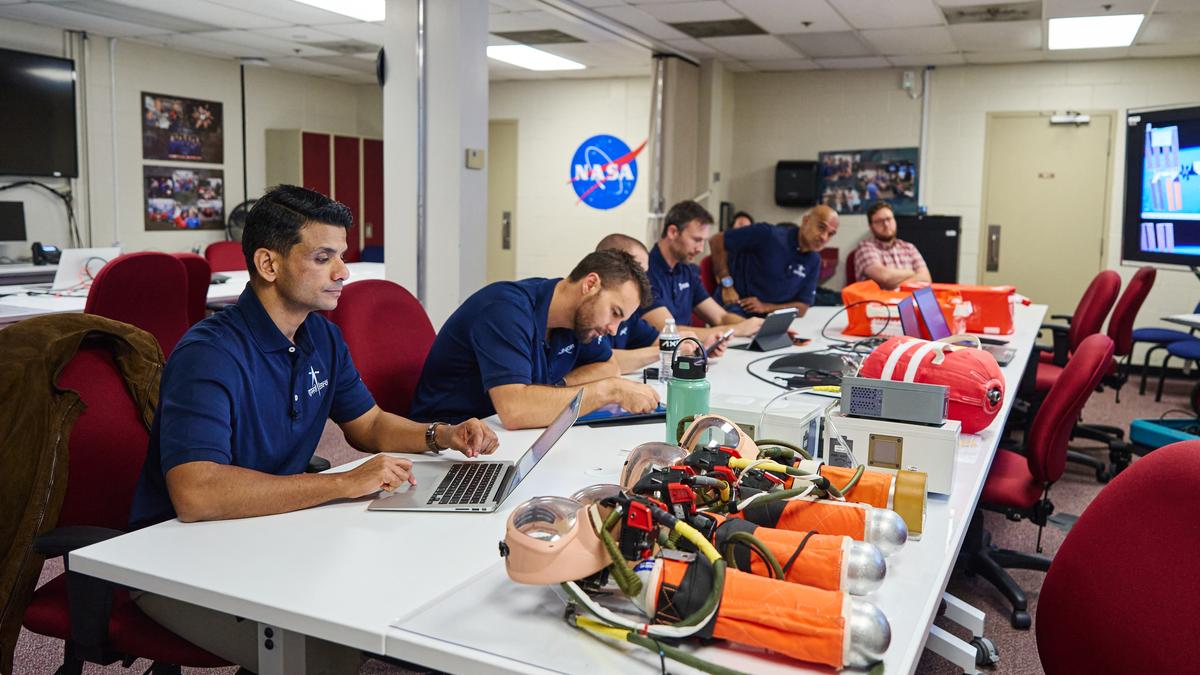Stephen McDonell
China correspondent
Watch as the BBC rides on board a driverless truck
They rumble down the highway between Beijing and Tianjin port: big lorries, loaded up and fully able to navigate themselves.
Sure, there is a safety driver in the seat, as per government regulations, but these lorries don't require them, and many analysts say it won't take long before they are gone.
When "safety driver" Huo Kangtian, 32, first takes his hands off the wheel, and lets the lorry drive itself, it is somehow impressive and disconcerting in equal measures.
For the initial stages of the journey, he is in full control. Then - at a certain point - he hits a few buttons, and the powerful, heavy machine is driving itself, moving at speed along a public road to Tianjin.
"Of course, I felt a bit scared the first time I drove an autonomous truck," says Mr Huo. "But, after spending a lot of time observing and testing these machines, I think they are actually pretty good and safe."
As the lorry veers off the freeway and up a ramp towards the toll gates, the machine is still driving itself. On the other side of the tollgate, Mr Huo again presses a few buttons, and he is back in charge.
"My job as a safety driver is to act as the last line of defence. For example, in the case of an emergency, I would have to take back control of the vehicle immediately to ensure everyone's safety," he explains.
In terms of the upsides for a driver, he says that switching to autonomous mode can help combat stress and fatigue, as well as freeing up hands and feet for other tasks. He says it doesn't make his job boring, but rather more interesting.
When asked if he is worried that this technology may one day render his job obsolete, he says he doesn't know too much about this.
It's the diplomatic answer.

 BBC/Rachel Yu
BBC/Rachel Yu
Safety driver Huo Kangtian thinks the driverless trucks are "pretty good and safe"
Pony AI's fleet of driverless lorries, currently operating on these test routes, is only the start of what is to come, the company's vice-president Li Hengyu tells the BBC.
"In the future, with driverless operations, our transportation efficiency will definitely be greatly improved," he says. "For example, labour costs will be reduced but, more importantly, we can deal better with harsh environments and long hours driving."
What this all boils down to is saving money, says industry expert Yang Ruigang, a technology professor from Shanghai Jiaotong University, who has extensive experience working on driverless technology in both China and the US.
"Anything that can reduce operating costs is something a company would like to have, so it's fairly easy to justify the investment in having a fully autonomous, driverless truck," he tells the BBC.
In short, he says, the goal is simple: "Reduce the driver cost close to zero."
However, significant hurdles remain before lorries will be allowed to drive themselves on roads around the world - not the least of which is public concern.
In China, self-driving technology suffered a major setback following an accident which killed three university students after their vehicle had been in "auto pilot" mode.
Economist Intelligence Unit analyst Chim Lee says the Chinese public still has quite a way to go before it is won over.
"We know that recent accidents involving passenger cars have caused a huge uproar in China. So, for driverless trucks – even though they tend to be more specific to certain locations for the time being – the public's image of them is going to be absolutely critical for policy makers, and for the market as well, compared to passenger vehicles."
Professor Yang agrees that lorry drivers are unlikely to lose their jobs in large numbers just yet.
"We have to discuss the context. Open environment? Probably not. High speed? Definitely no. But, if it is a low-speed situation, like with the last mile delivery trucks, it's here already."

 BBC/Joyce Liu
BBC/Joyce Liu
The city of Hefei now lets driverless lorries operate on its streets
In Eastern China's Anhui Province, hundreds of driverless delivery vans navigate their way through the suburban streets of Hefei - a city with an official population of eight million - as human-driven scooters and cars whizz around them.
It was once one of country's poorest cities, but these days its government wants it to be known as a place of the future, prepared to give new technology a chance.
Gary Huang, president of autonomous vehicle company, Rino.ai, says they discovered a market niche where driverless delivery vans could send parcels from big distribution hubs run by courier companies to local neighbourhood stations. At that point, scooter drivers take over, dropping off the packages to people's front doors.
"We're allowing couriers to stay within community areas to do pickup and drop off while the autonomous vans handle the repetitive, longer-distance trips. This boosts the entire system's efficiency," he tells us.
Rino has also been talking to other countries, and the company says the quickest uptake of its vehicles will be in Australia later this year, when a supermarket chain will start using their driverless delivery vehicles.
Meanwhile, in China, they say they're now running more than 500 vans with road access in over 50 cities.
However, Hefei remains the most advanced.
Apart from Rino, the city has also now given permission for other driverless delivery van companies to operate.
Gary Huang says this is due to a combination of factors.
"Encouragement came from the government, followed by local experimentation, the gaining of experience, the refinement of regulations and eventually allowing a broad implementation."
And you can see them on the roads, changing lanes, indicating before they turn, pulling up at red lights and avoiding other traffic.
For the courier companies, the numbers tell the story.

 BBC/Joyce Liu
BBC/Joyce Liu
Are driverless lorries the future for China's roads?
According to Rino's regional director for Anhui Province, Zhang Qichen, deliveries are not only faster, but companies can hire three autonomous electric delivery vans which will run for days without needing a charge for the same cost as one driver.
She says she has been blown away by the pace of change in her industry and adds that she would not be surprised if heavy, long-haul lorries are routinely driving themselves on roads in certain circumstances within five years.
Professor Yang agrees. "Heavy trucks running along a highway unrestricted, at least five years away."
When asked if it could really happen so soon, he responds: "I'm pretty sure it will happen. In fact, I'm confident that it will happen."
Industry insiders say that the most immediate applications for driverless lorries – apart from in enclosed industrial zones likes open-cut mines or ports – are probably in remote, harsh terrain with extreme environmental conditions, especially along vast stretches and in a largely straight trajectory.
Significant technical challenges do remain though.
Heavy lorries need better cameras to track well ahead into distance to detect hazards much further down the road, in the same way a person can; more tricky roads may also need to have extra sensors placed along the route; other hurdles could include breakdowns in extreme weather or sudden, unexpected dangers emerging amidst very busy traffic.
On top of all this, the technology – when it comes to heavy lorries – is still not cheap. What's more, these vehicles are right now modified old style lorries rather than self-driving vehicles straight off the production line.
China wants to be a champion of new tech, but it also has to be careful, not only because of the potential for deadly accidents but also because of how Chinese people might view this shift.
"This is not just about fulfilling regulations. It is not just about building a public image," says Chim Lee. "But that, over time, the public will see the benefit of this technology, see how it will reduce their costs for buying things, or look at it as a way of imagining that society is improving, rather than viewing this as technology which is potentially destroying, causing car accidents or removing employment opportunities."
Professor Yang sees another problem. "We humans can tolerate another human driver making mistakes but our tolerance for autonomous trucks is much much lower. Machines are not supposed to make mistakes. So, we have to make sure that the system is extremely reliable."

 17 hours ago
2
17 hours ago
2








 English (US) ·
English (US) ·